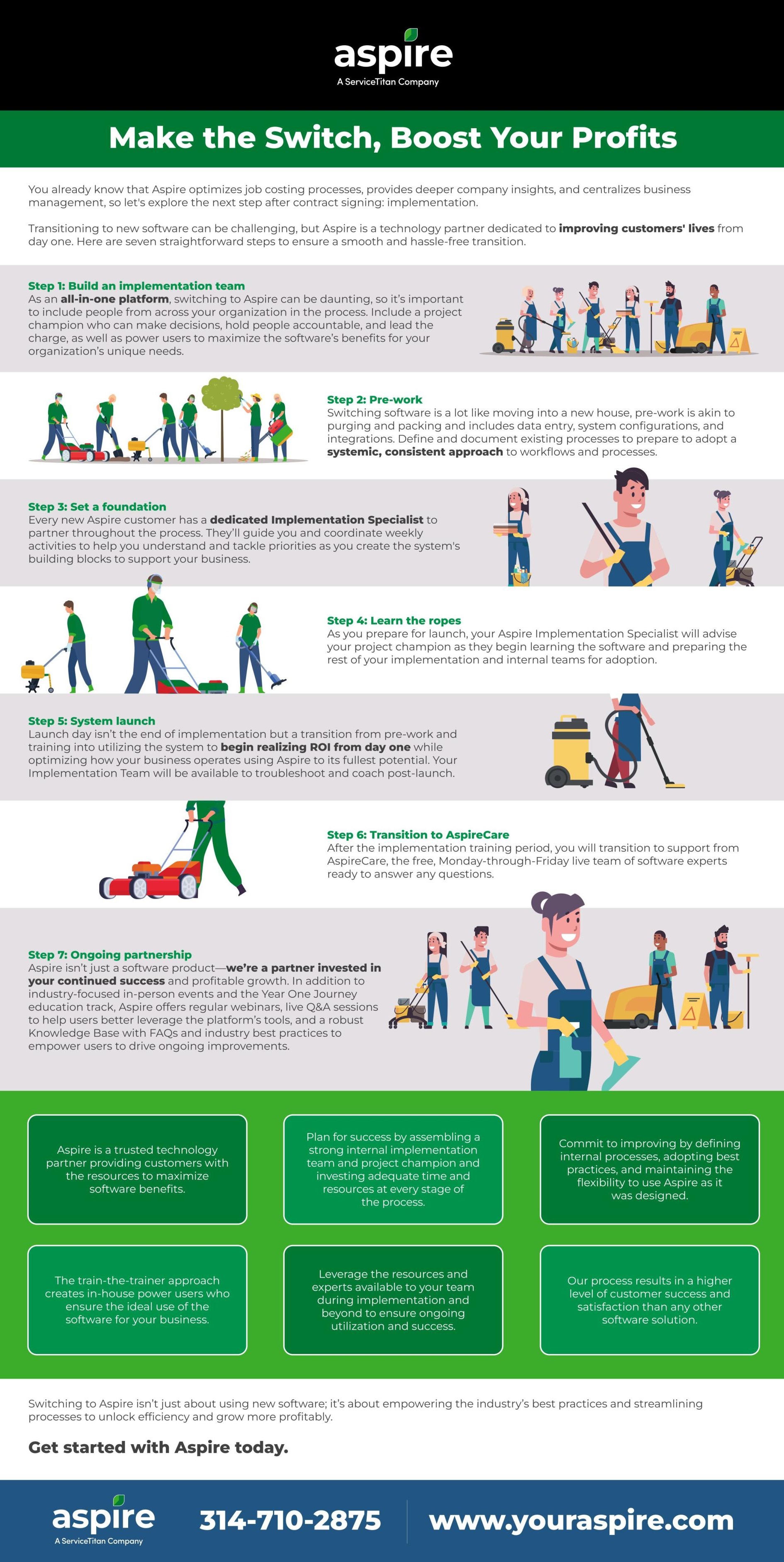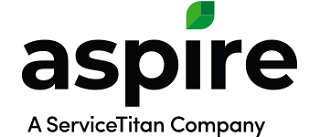
 LANDSCAPE BUSINESS SOFTWARE: The right tools make all the difference
Your Aspire Software landscape business solutions .... A Service Titan Company
If you want to make moves in the landscape industry, you've come to the right place. Aspire's family of cloud-based software solutions gives contractors the tools they need to get the job done more efficiently—and profitably—than ever before. Aspire Software solutions are designed to help solve the challenges that keep you up at night, so you can focus on what matters most to your business: profitable growth.

Powering the landscaping industry's most significant growth
Landscape business software gives contractors the tools they need to create winning bids, plan jobs, schedule crews, run reports, and get paid. By moving away from outdated systems, the most successful landscapers are able to operate with better data and less waste, managing projects seamlessly (and profitably) from start to finish.
Field service software to drive growth -- Landscaping and commercial cleaning businesses use Aspire to streamline, automate, and optimize processes. With precise bidding, real-time job costing, and live performance insights, owners improve margins and unlock new profit potential.

|

The Blossoming $182 Billion U.S. Landscaping Industry
The pristine lawns, vibrant flower beds, cultivated shrubbery, and trees of your community represent more than just aesthetics -- they're created by a rapidly expanding industry. The landscaping services sector has blossomed into an economic force, projected to swell to $182.76 billion in revenue by 2025. With such fertile ground for growth, over 1.3 million landscapers and groundskeepers make their living maintaining outdoor spaces for residential and commercial clients nationwide. While sunny locations like California, Florida, and Texas employ the highest number of landscapers, this booming industry has taken root across all 50 states.
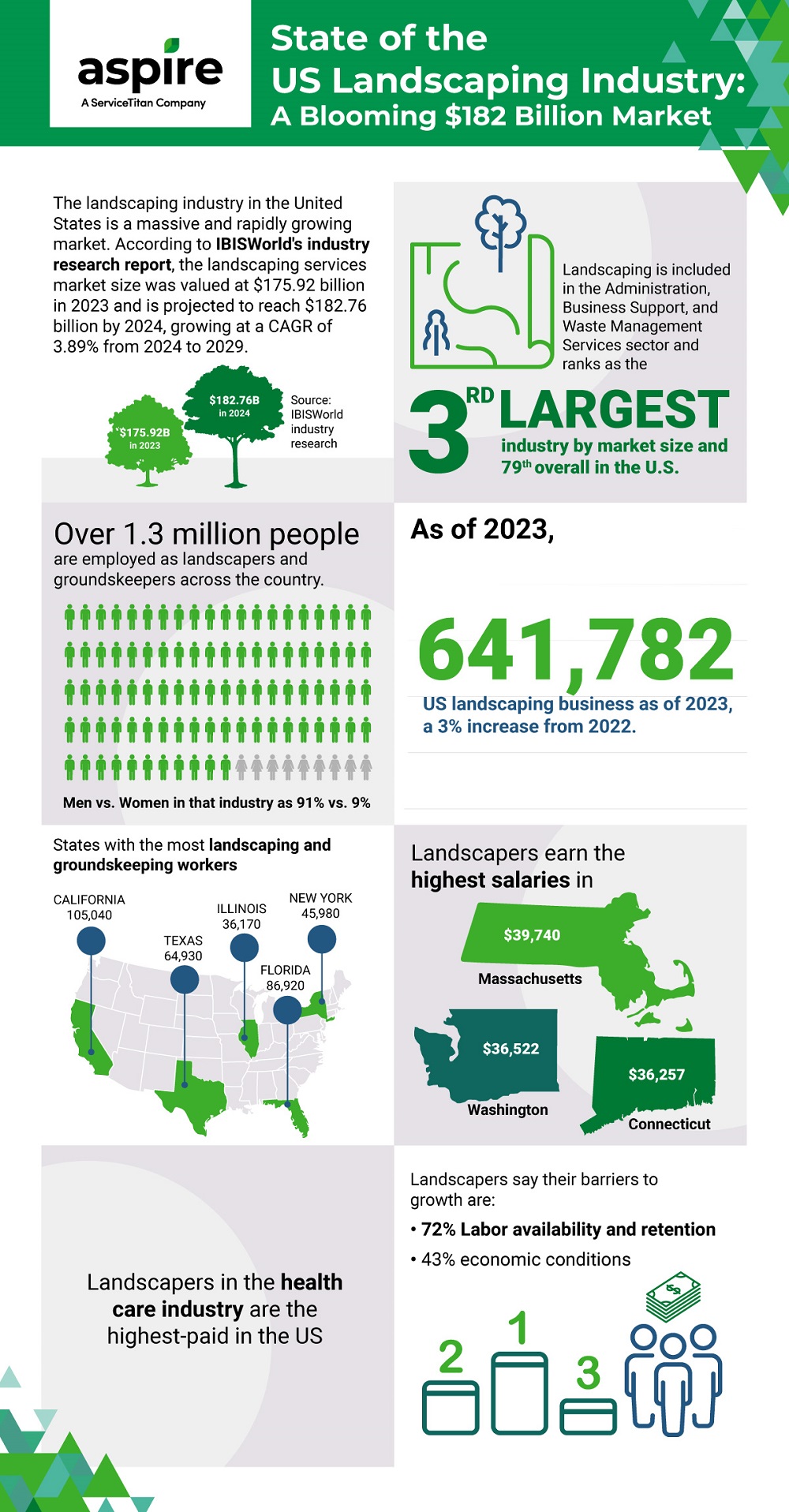
Cultivating a thriving landscaping business
As the landscaping market grows, so do the challenges facing companies operating in this labor-intensive industry. A recent survey revealed that 72% of businesses cited labor availability and retention as the overwhelming barrier to growth. Economic conditions (43%) represented the next highest concern but trailed far behind workforce issues. To cultivate success in this competitive, high-growth environment, landscaping companies must strategically manage their operations, crews, assets, and finances. This is where implementing a cloud-based, end-to-end business management solution like Aspire can pay dividends.
The right business management software helps landscapers thrive no matter the state of the industry
A unified software platform enables landscapers to seamlessly handle mission-critical functions like:
- Scheduling and dispatching crews
- Managing equipment/asset maintenance
- Tracking labor hours and payroll
- Handling bids, estimates, and invoicing
- Monitoring real-time job costs and profitability
Businesses gain complete visibility across their organization by consolidating operations from single-point solutions. Aspire users maximize staff utilization, control spending, improve cash flow, and ultimately boost profits.

Revolutionizing Landscaping: Smart Solutions and Sustainable Practices
In the fast-changing world of landscaping services, embracing technology isn't just a trend—it's a way to significantly enhance efficiency and sustainability. The green industry is undergoing a transformation, fueled by several key trends that promise a greener, more efficient future. Let’s dive into how these emerging trends are shaping the industry.
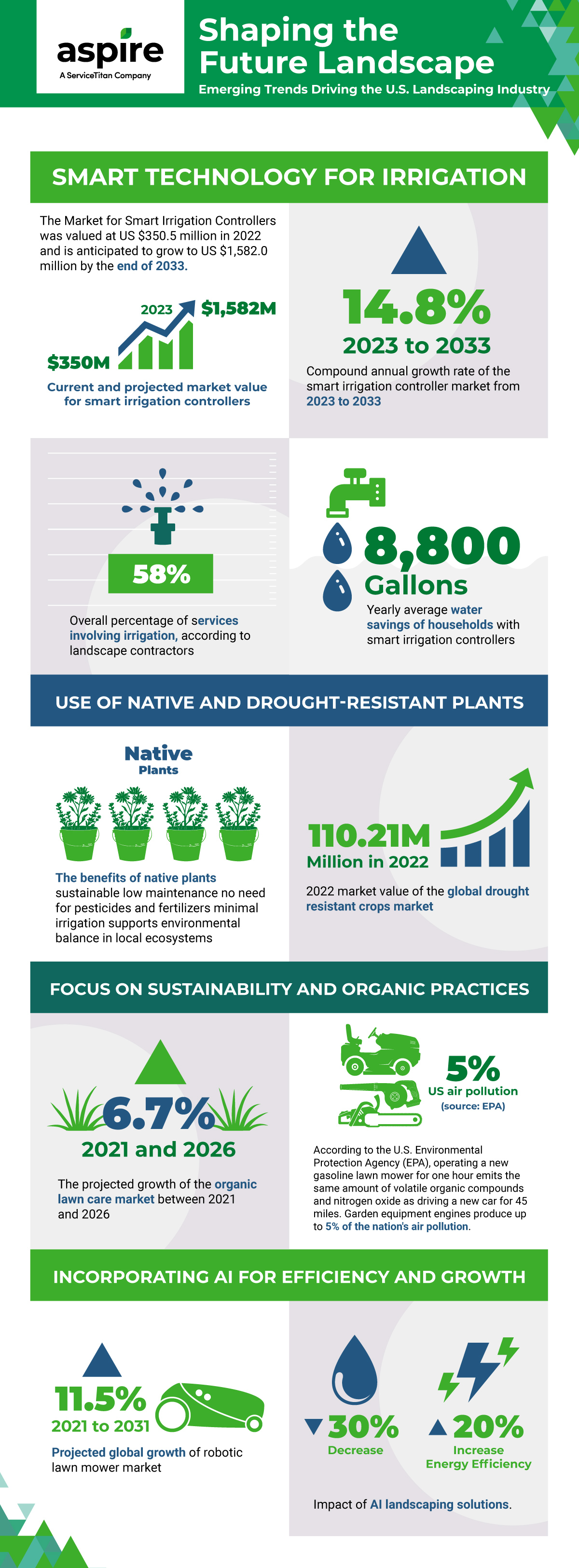
Embracing smart irrigation systems
The rapid growth of smart irrigation systems for both residential and commercial properties is just one aspect of the industry’s high-tech makeover. These systems are not just about watering plants efficiently—they represent a crucial shift toward sustainability. Smart irrigation also has financial benefits. Of the 58% of landscaping services that have already integrated high-tech solutions, specialists see increased revenue streams by 76%. Adopting smart irrigation can save households approximately 8,800 gallons of water annually, which is a win for homeowners on a budget and for the planet.
Turning to native and drought-resistant plants
The trend toward native and drought-resistant plants is reshaping properties to be more resilient and eco-friendly. Unlike their non-native counterparts, these plants require minimal maintenance—no pesticides, less watering, and no fertilizers—making them ideal for sustainable landscaping. This approach not only cuts down on maintenance costs but also supports local ecosystems and preserves biodiversity. The market for drought-resistant crops also reflects this shift, expected to grow robustly at a compound annual growth rate (CAGR) of 6.57% through 2028.
Organic and eco-friendly practices
The push for green doesn't stop with plants–the organic lawn care market is growing steadily as well. Traditional gardening tools are surprisingly heavy polluters, with one hour of gasoline lawn mower use equating to driving a new car for 45 miles. Switching to organic practices and using battery-powered equipment significantly reduces these environmental impacts, promoting cleaner air and a healthier soil ecosystem.
Incorporating AI for enhanced efficiency
The integration of AI in landscaping tools, particularly robotic lawn mowers, is set to transform garden care, promising an opulent growth with a CAGR of over 11.5% by 2031. AI doesn't just trim grass—it optimizes water and energy use, potentially reducing water usage by 30% and increasing energy efficiency by 20%. This technological advancement enables landscapers to provide superior service, more efficiently and sustainably.
Building a thriving, sustainable future
For field service companies in the landscaping industry, adopting innovative technologies and sustainable practices isn't just good for the earth—it's also smart business. Following and understanding industry trends enables business owners to implement cost-saving technology and processes ahead of the competition, giving them an edge in their market and empowering them to define best practices in landscaping in the future. By embracing smart technology, sustainable practices, and AI integration, landscaping businesses can implement cost-saving technology and processes to meet the demands of an evolving market and gain a competitive edge.
Aspire's comprehensive software solutions empower companies to seamlessly adopt these trends, optimize their operations, and maximize profits. Ready to transform your landscaping business? Explore how Aspire can help you capitalize on these industry-driving trends and set your business on a path to sustainable growth.

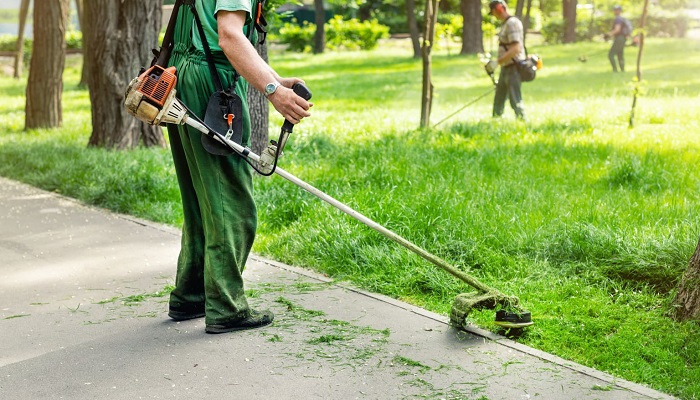 Munie Greencare: Aspirations
Munie Greencare Professionals is an Illinois-based company that specializes in grounds maintenance and lawn care services. Over the past 40 years, Munie has expanded operations to provide landscape maintenance for large multifaceted sites, athletic complexes, military housing communities, and more. The company currently has clients in ten states. Munie Greencare: A plan for implementation
Prior to implementing the Aspire platform, company owner Joe Munie was looking for a solution that could help him address multiple opportunities at the company, including:
- An effective CRM software to manage leads
- A more precise and reliable estimation process
- A way to better integrate production teams into the business
|
Brandi Smith, customer care manager at Munie, was an integral part of the Aspire implementation process. Her role was created after Munie Greencare first partnered with Aspire Software, so she could provide internal support and help the team maximize the benefits of the platform. Smith quickly became a “super user.” She learned the system’s functions inside and out, allowing her to field questions and help employees across different departments troubleshoot quickly.
Results
With the Aspire platform fully integrated into Munie Greencare, the company is especially pleased to see increased employee involvement when it comes to creating and managing work plans. Aspire has also helped Munie simplify the estimation process and provide a more consistent method for compiling quotes.
Smith finds the platform's interface to be self-explanatory, straightforward, and friendly for production-minded employees.
“We come from an industry where technology isn’t our thing,” Smith says. “The guys on top of mowers, they’d rather be on a mower than in front of their laptop. The simplicity of it is really helpful because it’s easy for my production people to catch onto and use.”
She’s confident that Aspire is intuitive enough for new users, regardless of their role in the company. “If somebody wanted to go through and explore it, and they’d never been into the software, they can easily understand how to navigate the features.”
Looking ahead
Looking to the future, Smith sees several ways Munie can further integrate the Aspire platform into business operations. For example, she imagines Munie will use data from Aspire to further streamline the estimation process.
“We want our account managers and production-focused employees to have everything set up with a simple, templated process that makes it easy to produce estimates as needed.”
Smith also foresees a time when Munie would consider Aspire fluency as part of its employee evaluations. “I see us using our scorecards for managers to base some of their performance reviews on what they can do in Aspire,” says Smith.
Words of advice
One piece of advice that Smith wishes she had before going live is: keep it simple.
“You don’t need to overcomplicate your services, your items, or even your kits,” she says.
Smith also recommends learning more about why certain information is tracked in Aspire and how the software uses those stats to yield results that inform business decisions. Take the time to really get to know and understand the functionality.
“Ask questions about how the system functions, so when you’re filling out spreadsheets and doing data dumps, you understand why you’re adding these numbers,” she recommends. “That will help the data make sense in Aspire because you know its purpose.”

